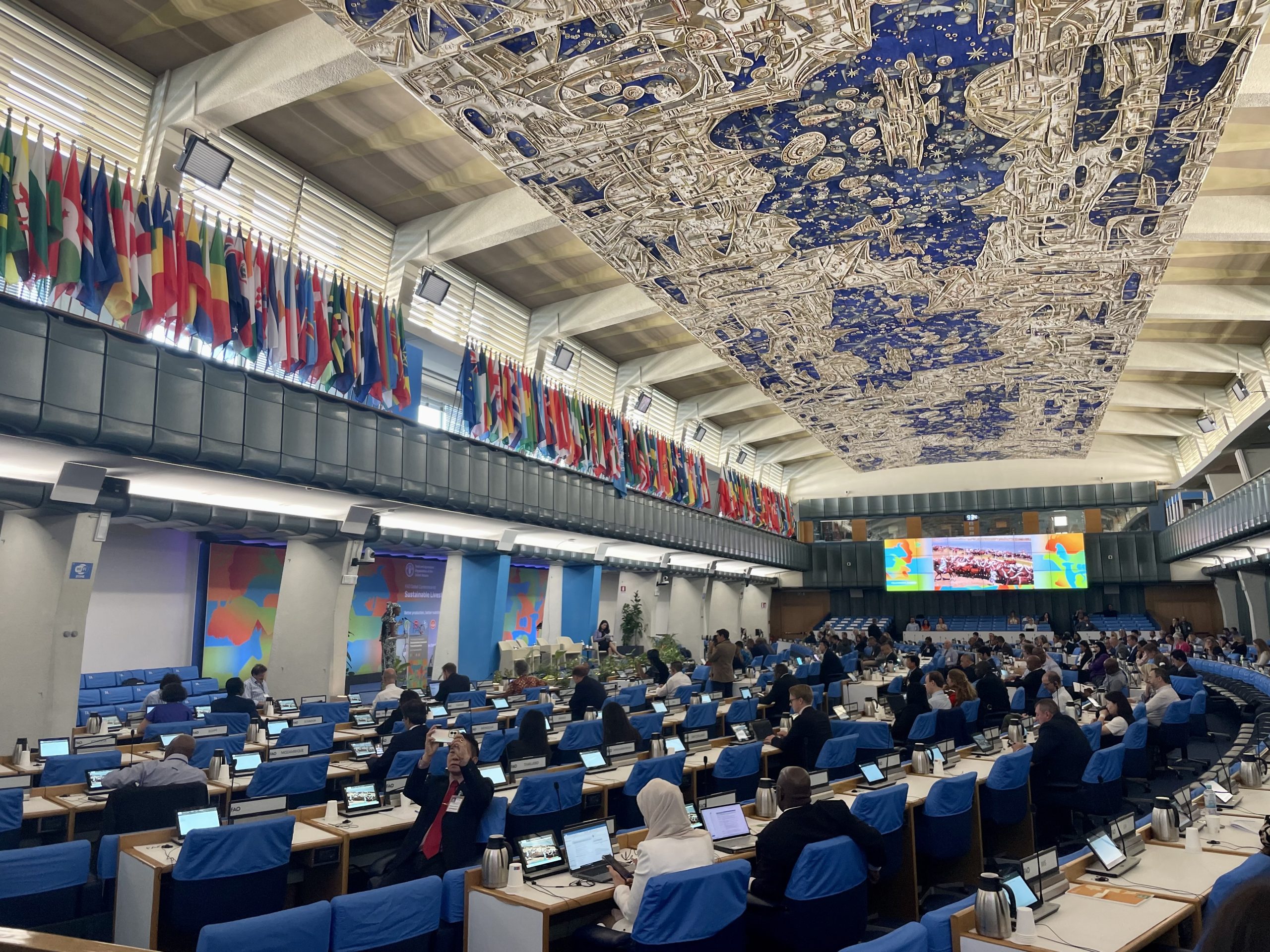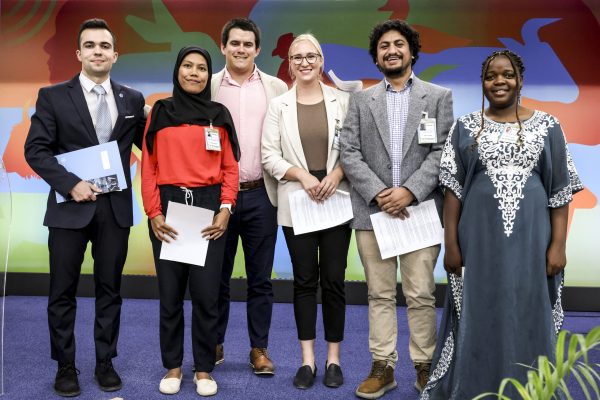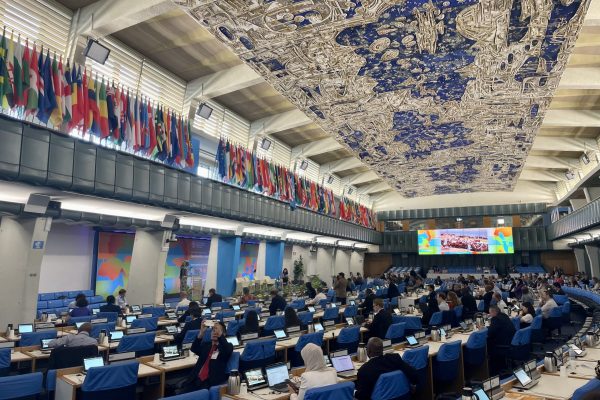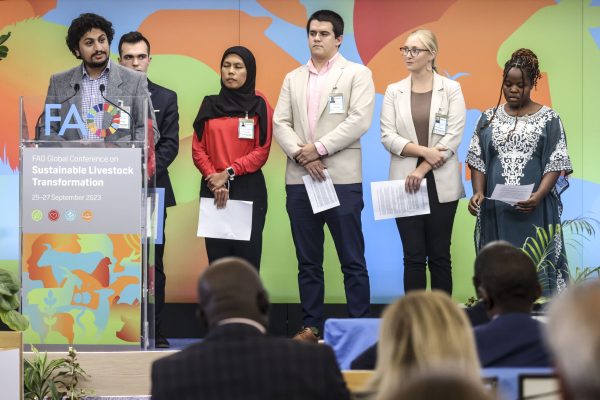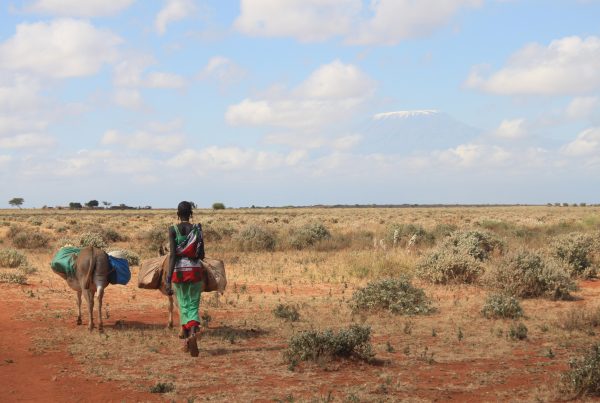FAO Global Youth Dialogue on Sustainable Livestock Transformation, September 2023 in Rome.
Written by Abdul Wahid Khan, PhD student, School of Geography and the Environment, University of Oxford
The Food and Agricultural Organization of the United Nations (FA0) organised the first-ever Global Youth Dialogue on Sustainable Livestock Transformation on 25-27th of September 2023 at FAO headquarters in Rome (Italy) in collaboration with UNIMED – Mediterranean Universities Union as part of the wider FAO Global Conference on Sustainable Livestock Transformation (GC-SLT). I had the privilege to attend this conference along with 100+ young people from across the globe, and the FAO funded some of the participants to attend this gathering. The dialogue aimed to bring the youth together to identify the key challenges that young people affiliated with livestock face and to present innovative and practical solutions for sustainable livestock transformation.
On the first day, we were able to attend the opening plenary session of the Global Conference on Sustainable Livestock Transformation where we had the opportunity to listen to various speakers, including QU Dongyu, FAO Director-General, ministers and academics from different countries and Introduction to the Voices of Youths from two youth representatives. Most speakers focused on scientific and technological solutions, a collaboration between various stakeholders and bringing livestock to the front of global discussions. What struck me the most was a statement from H.E. Fernando Mattos, Uruguay’s Minister for Livestock, Agriculture and Fisheries, who said that many people blame livestock for climate change. The problem of climate change is not created by cows, it is created by humans and what humans are doing to the world. Livestock is not a problem; it is a part of the solution. That bold statement from a minister at a global conference was an encouraging dose of motivation for the young people to go to their sessions and challenge the biases against pastoralists, farmers, livestock producers and distributors in policymaking and beyond.
The first day’s session in the youth dialogue revolved around social, economic, environmental, and cross-cutting challenges that are faced by young people who are affiliated with the livestock sector. There were interesting discussions around urbanisation and migration, miserable working conditions, lack of openness to innovation from farmers and the negative connotations attached to livestock as social challenges. Economic challenges included complicated processes of bank loans and value chains, access to the market, inflation, economic instability, and lower income from the livestock sector. Environmental challenges include land degradation, green grabbing, the impact of climate change, policies of government around environmental regulations, climate change bias towards the livestock sector and lack of education around climate change and its link with the livestock industry. Later, the youth groups presented solutions to these issues as well.
Some of the opportunities and solutions for the social challenges that were discussed by the youth included creating platforms for knowledge sharing, storytelling, and social media engagement for the involvement of young people and creating multiple layers of collaborations for dealing with these issues. The economic opportunities discussed constituted easy access to the market and finance for the livestock sector, increased trade channels, collaborations, more job opportunities, consumer engagement for increased demand, etc. The environmental opportunities included the involvement of technology, more career opportunities in the environment sector, knowledge-sharing opportunities and dealing with the bias of climate change towards the livestock sector. Throughout the two days, many young people also shared their success stories of how they are making a difference in the livestock sectors and practically implementing the solutions that were discussed.
The final part of the youth dialogue was to come up with a youth statement that was later presented to the ministers from around the world in the plenary session of the closing ceremony. The statement was to be drafted in one session, but the youth took this job seriously and we worked on the statement till 09: 00 pm at night and spent another session the next day to finalise the draft. This shows that young people are super motivated to engage in such discussions and to work around a diverse group of people with differing worldviews. In the end, the statement was ready, and I was selected to be one of the presenters which was an amazing experience as well. The Global Youth Statement on Sustainable Livestock Transformation is available online now and can be found here: https://www.fao.org/3/cc8053en/cc8053en.pdf
While this dialogue was successful in bringing together youth from around the world to discuss the mutual issues of the livestock sector, I would like to reflect on a few things that can be made better. First of all, this one-off meeting would not be enough, and I hope that there is a more sustainable way to engage youth in the future as we have highlighted in the youth statement. Furthermore, there was not enough representation of pastoralist communities in the livestock sectors whose livelihood depends on livestock and they keep livestock for sustenance rather than for the market. Most of the discussions throughout the conference were targeted at how the “productivity” of the livestock sector can be increased without much consideration towards livestock as a source of living. There were a few sessions where speakers focused on the fact that pastoralists should be seen as partners rather than as beneficiaries. Many of the notes and texts from FAO already suggested that pastoralists are “poor” people and I hope that after these discussions, such misconceptions would change. One of the highlights of this conference was that the youth who are working on pastoralism met for lunch and discussed the Youth Working Group for the International Year of Rangelands and Pastoralists 2026. Nevertheless, we thank FAO for organising this youth dialogue and including the youth voice in the important discussion on livestock transformation.
